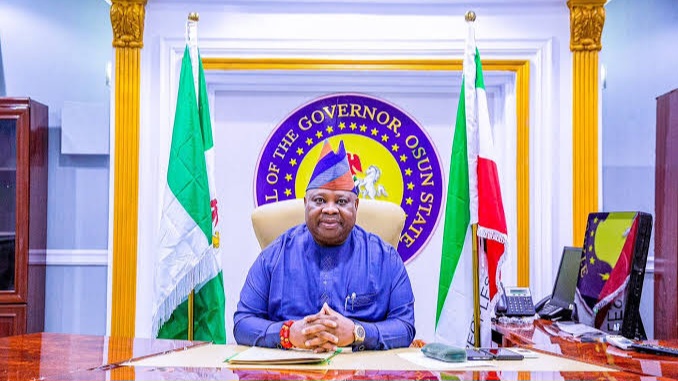The political tension between Osun State and the Federal Government has deepened, as the state government, under Governor Ademola Adeleke, has dragged the Attorney-General of the Federation, Lateef Fagbemi (SAN), before the Supreme Court over what it described as the unconstitutional and arbitrary withholding of statutory allocations meant for the state’s 30 local government councils since March 2025.
This fresh lawsuit, filed on Monday by the Osun State Attorney-General and Commissioner for Justice, comes months after the state sought to discontinue an earlier suit on the same matter. The legal team, led by prominent senior advocates Mike Ozekhome (SAN) and Musibau Adetunbi (SAN), is demanding that the apex court compel the Federal Government to release the seized funds and permanently restrain it from further interference with allocations due to local councils in the state.
According to the originating summons filed at the Supreme Court, Osun State accused the Federal Government of flouting existing judgments of the Federal High Court in Osogbo delivered on November 30, 2022, and the Court of Appeal ruling of June 13, 2025. Both judgments affirmed the legitimacy of the council chairmen and councillors elected in the February 22, 2025, local government polls conducted under the current administration.
The state argued that despite these subsisting judgments, the AGF, in a letter dated March 26, 2025, directed the withholding of the funds, citing a “local government crisis” in the state. Osun, however, insists that the appellate court ruling had already settled the dispute by nullifying the controversial October 2022 local government polls conducted during the previous administration.
In its prayers before the Supreme Court, Osun is seeking several declarations, including that the AGF lacks the constitutional powers to direct the seizure or withholding of local government funds. The state also wants the court to declare that the AGF’s actions amount to a direct affront to the judiciary, particularly in light of Section 287 of the 1999 Constitution (as amended), which mandates compliance with judgments of superior courts of record. Furthermore, Osun is seeking a perpetual injunction preventing the Federal Government or its agents from ever interfering in the disbursement of local government allocations due to the state.
“The seizure, suspension, withholding and/or refusal to pay the allocations and revenues due to the constituent local government councils of the plaintiff state… is unconstitutional, unlawful, wrongful and ultra vires the powers of the defendant,” part of the suit reads.
The state also raised concerns over the AGF’s perceived disregard for judicial authority. It argued that the directive to withhold the funds in the face of a clear appellate court ruling demonstrated executive overreach and a dangerous precedent for federal-state relations. According to the originating summons, the Federal Government’s refusal to release the funds has crippled grassroots governance in Osun, stalling development projects and leaving local councils unable to deliver basic services to their communities.
In a supporting affidavit deposed by Olufemi Akande Ogundun, the Permanent Secretary of the Ministry of Local Government and Chieftaincy Affairs, the state government described the Federal Government’s actions as “an affront to the rule of law.” Ogundun emphasized that only the Supreme Court could conclusively resolve the constitutional issues at stake. He cited precedents such as A.G. Kano State v. A.G. Federation (2007) and RMAFC v. A.G. Rivers State (2023), which underscore the supremacy of judicial orders and the obligation of federal institutions to comply with court rulings.
The crisis took a dramatic turn when the state government accused the AGF of creating a “self-induced urgency” in the case. According to court documents, the AGF allegedly ignored originating processes for over 80 days before suddenly filing an affidavit of urgency on August 13, 2025. This, Osun argued, was a deliberate tactic to delay justice while presenting an image of responsiveness before the courts.
In a parallel legal maneuver, Osun has also filed another suit at the Federal High Court, Osogbo, challenging the decision of the Chief Judge of the Federal High Court to transfer an earlier case related to the same funds from Osogbo to Abuja, where it was assigned to a vacation judge. The state government described the transfer as a breach of judicial protocol, warning that it risks creating conflicting judgments between the Abuja court and the Supreme Court.
Legal experts following the development have described Osun’s actions as a bold attempt to draw a clear line on the limits of federal power over state and local government autonomy. Constitutional lawyer and political analyst Barrister Tayo Oladimeji noted that this case has the potential to redefine the relationship between the three tiers of government in Nigeria.
“This is more than just about money,” Oladimeji explained. “It is about the sanctity of the rule of law and the principle of federalism. The Supreme Court will be called upon not only to resolve the immediate dispute but also to make a definitive pronouncement on whether the Federal Government has the right to interfere in the finances of constitutionally recognized local governments.”
At the heart of the dispute is the question of whether the Federal Government, through the AGF, has the authority to unilaterally determine the status of local governments and control their statutory allocations. Section 7(1) of the Constitution guarantees the existence of democratically elected local councils, while Section 162 outlines how funds from the Federation Account should be shared among the three tiers of government. Osun argues that the AGF’s directive violates these provisions and undermines democratic governance at the grassroots level.
Beyond the legal arguments, the financial implications for Osun are significant. Local governments across the state have reportedly been struggling to pay workers’ salaries, maintain public infrastructure, and fund basic services due to the prolonged withholding of their allocations. Community leaders have voiced growing frustration over stalled development projects, warning that the continued standoff threatens stability at the local level.
Political analysts also believe the crisis could have wider political implications ahead of the 2027 general elections. The withholding of funds is being interpreted in some quarters as an attempt to weaken the Adeleke administration and its political base. Others, however, argue that the Federal Government may simply be trying to prevent the mismanagement of funds pending the resolution of what it perceives as a leadership crisis at the local government level.
Meanwhile, there is growing anticipation over how the Supreme Court will handle the matter. While no date has yet been fixed for the hearing, legal observers predict that the court could issue interim orders directing the immediate release of funds pending the final resolution of the case, particularly given the urgency of the situation and the constitutional questions involved.
For Osun State, this legal battle is about more than immediate financial relief. It is a fight to assert the independence of state and local governments within the framework of Nigeria’s federal system. For the Federal Government, it is a test of its interpretation of its supervisory powers over local government administration and its role in ensuring accountability in public finance.
The stakes are high. A ruling in favor of Osun could significantly limit federal interference in local government administration nationwide and strengthen the autonomy of states in managing their internal affairs. Conversely, a judgment in favor of the Federal Government could embolden Abuja to take a more assertive role in state and local governance, potentially reshaping the delicate balance of power in Nigeria’s federal structure.
For now, the people of Osun wait anxiously as their councils operate in limbo, starved of the funds they need to serve their communities. The legal fireworks in the coming weeks will not only determine the flow of billions of naira in allocations but will also shape the constitutional landscape of Nigeria for years to come.




